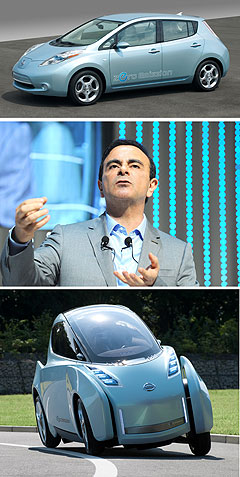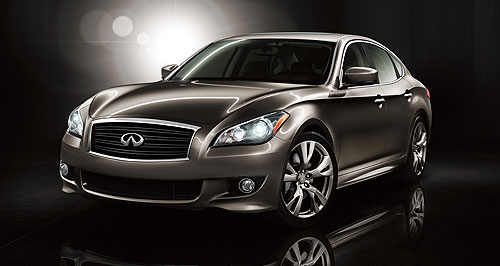Make / Model Search
Future models - NissanTokyo show: Nissan to broaden EV line-upGoing electric: Nissan's up-market Infiniti brand is set to get its own electric car, alongside models such as the 2011 Infiniti M. Nissan announces all-electric Infiniti and van – and plan to recycle batteries22 Oct 2009 By TERRY MARTIN NISSAN Motor Co will broaden the application of its all-electric powertrain beyond the 2011/12 Leaf EV, announcing at the Tokyo motor show this week that a zero-emissions high-performance Infiniti luxury car and a Nissan light commercial van were also in development. Nissan president and chief executive Carlos Ghosn broke the news as the Leaf made its world motor show debut, but he provided few specific details about the Infiniti version. “For now, I can tell you that it will be a compact luxury car, a stylish, high-performance four-seater with zero emissions,” he said. The car is expected to offer higher levels of performance than the Leaf, following Mr Ghosn’s assurances that the EV will be “true to the Infiniti brand’s promise of inspired performance”, and should follow soon after the M35 Hybrid is launched in select overseas markets in 2011. Infiniti remains on the agenda for Australia, but Nissan is waiting for market conditions to improve before committing to the prestige brand here. Mr Ghosn also used his speech at Tokyo to confirm that an electric version of Nissan’s NV200 van was in development, while the novel Land Glider EV concept that captured most attention on the Nissan stand is being described as a production-oriented proposal.  From top: Nissan Leaf EV, Nissan president and CEO Carlos Ghosn, Nissan Land Glider. From top: Nissan Leaf EV, Nissan president and CEO Carlos Ghosn, Nissan Land Glider.On the Leaf, Mr Ghosn said orders would be taken in the US, Japan and Europe early next year, with the first deliveries scheduled to take place late in 2010. Global mass marketing, including sale in Australia, will follow in 2012. Nissan also announced this week that it had initiated a business venture with the Sumitomo Corporation to recycle lithium-ion batteries used in electric cars, giving them a “second life” as energy storage solutions in markets worldwide. While there is currently no existing supply of large-capacity reusable batteries, Nissan believes the demand for ‘second life’ batteries will, by 2020 in Japan, reach the equivalent of 50,000 electric cars a year, at the minimum. A feasibility study is still to be done, although both companies expect to have a joint-venture company operational in Japan and the US by late 2010. A European program is also being explored with Nissan alliance partner Renault. “We recognise Nissan’s unique responsibility as the first company in the world to commit to delivering affordable zero-emission mobility,” said Nissan chief operating officer Toshiyuki Shiga. “Consumers are excited by the promise of all-electric, zero-emission cars, but they also want assurances that lithium-ion batteries can be reused and recycled. In fact, our batteries are not only reusable, they also contribute as a solution to energy storage.” According to Nissan, the high-performance lithium-ion batteries used in its EVs – which are built in collaboration with NEC Corporation – will retain 70 to 80 per cent of residual capacity at the end of their normal vehicle life. As a result, the batteries can be resold to various industries for energy storage. For Sumitomo, these second-life batteries will augment a wide range of its existing businesses, such as raw materials supply, car leasing, logistics and recycling. “As a company that handles initiatives from natural resources and battery materials to building an infrastructure for electric vehicles, we are quite pleased to announce our work with Nissan to create a new market with second-life batteries,” said Sumitomo Corporation executive vice-president Kazuo Ohmori. “In coming years, our social commitment is to contribute to the substantial reduction of carbon dioxide.” This new business model is part of Nissan’s plan to manage the entire “value chain” of the EV battery pack, which is the most expensive component in the vehicle. Nissan’s zero-emissions business unit chief Hideaki Watanabe said: “This direct management of the battery’s entire value chain is important to ensure that our EV customers do not bear the cost of the battery. “Nissan is exploring several options including battery lease or credit model based on a monthly payment scheme. With this proposition, the total running cost, which equals the monthly battery payment plus the cost to charge the battery, is comparable to the cost to refuel a similar gasoline-powered car. “Ultimately, this is a compelling economic proposition for a zero-emission car that meets all your driving needs.”  Read more21st of October 2009  Tokyo show: Nissan unveils tweaked GT-R supercar‘Continuous evolution’ for Nissan’s super-coupe refines performance and dynamics8th of October 2009  Tokyo show: Nissan rolls out its Land GliderLand Glider EV to headline Nissan’s Tokyo wares as Infiniti confirms its first hybrid11th of August 2009  Nissan to lease Leaf EVLeaf won’t be Oz’s first EV, but Nissan says it will be first with mass-market priceAll future models Alfa Romeo Alfa Romeo Abarth Abarth Alpine Alpine Alpina Alpina Audi Audi Aston Martin Aston Martin BMW BMW Bentley Bentley Chery Chery Brabham Brabham Chrysler Chrysler Chevrolet Chevrolet Cupra Cupra Citroen Citroen DS DS Dodge Dodge Fiat Fiat Ferrari Ferrari Foton Foton Ford Ford Great Wall Great Wall FPV FPV Haval Haval GWM GWM Honda Honda Holden Holden Hummer Hummer HSV HSV Infiniti Infiniti Hyundai Hyundai Jaguar Jaguar Isuzu Isuzu Kia Kia Jeep Jeep Land Rover Land Rover Lamborghini Lamborghini Lexus Lexus LDV LDV Mahindra Mahindra Lotus Lotus Mazda Mazda Maserati Maserati Mercedes-AMG Mercedes-AMG McLaren McLaren MG MG Mercedes-Benz Mercedes-Benz Mitsubishi Mitsubishi Mini Mini Opel Opel Nissan Nissan Peugeot Peugeot Pagani Pagani Proton Proton Porsche Porsche Renault Renault Ram Ram Rover Rover Rolls-Royce Rolls-Royce Skoda Skoda Saab Saab SsangYong SsangYong Smart Smart Suzuki Suzuki Subaru Subaru Toyota Toyota Tesla Tesla Volvo VolvoMotor industry news |
Click to shareNissan modelsResearch Nissan All future models Alfa Romeo Alfa Romeo Abarth Abarth Alpine Alpine Alpina Alpina Audi Audi Aston Martin Aston Martin BMW BMW Bentley Bentley Chery Chery Brabham Brabham Chrysler Chrysler Chevrolet Chevrolet Cupra Cupra Citroen Citroen DS DS Dodge Dodge Fiat Fiat Ferrari Ferrari Foton Foton Ford Ford Great Wall Great Wall FPV FPV Haval Haval GWM GWM Honda Honda Holden Holden Hummer Hummer HSV HSV Infiniti Infiniti Hyundai Hyundai Jaguar Jaguar Isuzu Isuzu Kia Kia Jeep Jeep Land Rover Land Rover Lamborghini Lamborghini Lexus Lexus LDV LDV Mahindra Mahindra Lotus Lotus Mazda Mazda Maserati Maserati Mercedes-AMG Mercedes-AMG McLaren McLaren MG MG Mercedes-Benz Mercedes-Benz Mitsubishi Mitsubishi Mini Mini Opel Opel Nissan Nissan Peugeot Peugeot Pagani Pagani Proton Proton Porsche Porsche Renault Renault Ram Ram Rover Rover Rolls-Royce Rolls-Royce Skoda Skoda Saab Saab SsangYong SsangYong Smart Smart Suzuki Suzuki Subaru Subaru Toyota Toyota Tesla Tesla Volvo VolvoMotor industry news |











Facebook Twitter Instagram